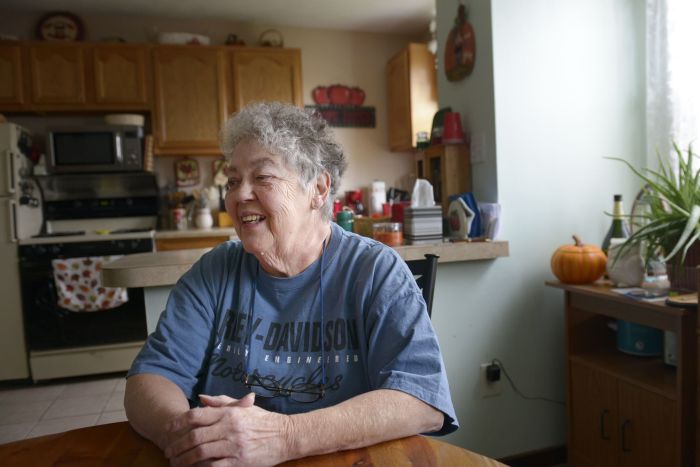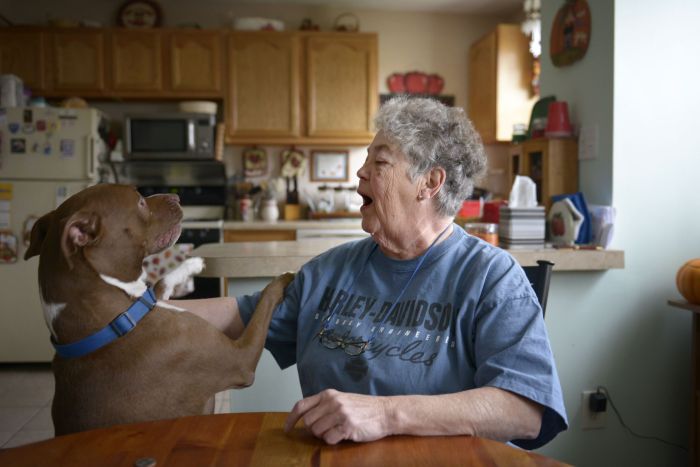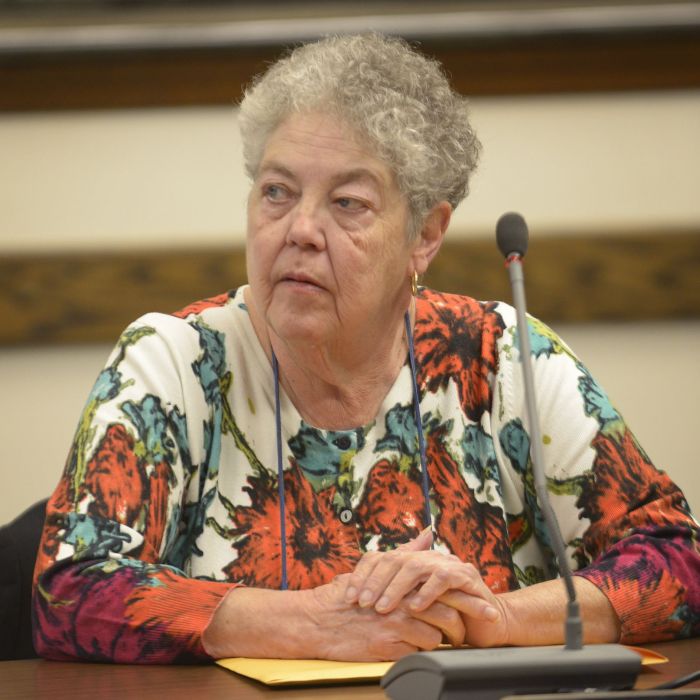Fink, Jean
Frank, informed voice of Jean Fink leaves Pittsburgh school board after 33 years
November 29, 2013 9:58 AM
By Eleanor Chute / Pittsburgh Post-Gazette
 Photo by: Julia Rendleman/Post-Gazette
Photo by: Julia Rendleman/Post-Gazette
Jean Fink, seen here at her home in Carrick, is leaving the board of the Pittsburgh Public Schools after more than 30 years in office.
 Photo by: Julia Rendleman/Post-Gazette
Photo by: Julia Rendleman/Post-Gazette
Jean Fink, seen here at her Carrick home with her dog, Tippy, is leaving the board of the Pittsburgh Public Schools after more than 30 years in office.
 Photo by: Julia Rendleman/Post-Gazette
Photo by: Julia Rendleman/Post-Gazette
Jean Fink on Nov. 4, 2013
When a fellow Pittsburgh Public Schools board member suggested asking some graduates who are successful rappers to promote the district, Jean Fink's retort combined her decades of experience on the board, her status as a great-grandmother and her traditional values.
Noting her years of service, Ms. Fink, who attended her last school board meeting this week, said she was against it.
"When we as educators, start promoting and glorifying young men who preach the coolest thing is to get high on weed, and every other sentence in their songs contains the F-word, I'm sorry. I think it's wrong. I don't think we should be promoting these people," said Ms. Fink, who knew of some of the rappers.
In recent times, Ms. Fink, a resident of Carrick since 1964, didn't necessarily comment as often as she did in her early years when she fought against forced busing for desegregation.
But her voice still provided frank insights and a dose of institutional knowledge.
"Probably over her tenure, she's played many different roles. Her current one is like the elder stateswoman," said Carey Harris, executive director of A+ Schools, an education advocacy group. "She really brings some wisdom to some conversations."
Ms. Fink has served on the board for 33 years.
On Monday, her successor in District 7, Cynthia Falls, will be sworn in. The district includes all or part of Carrick, Overbrook, Bon Air, Knoxville, Mount Oliver, St. Clair, South Side Slopes, South Side Flats, Arlington Heights and Arlington.
None of the four departing board members -- Ms. Fink, Sharene Shealey, Theresa Colaizzi and Floyd "Skip" McCrea -- sought re-election.
"It's just time," said Ms. Fink, the parent of six, grandmother of eight and great-grandmother of four.
"I'm 69 years old. I was 31 the first time I ran. The issues are a lot different. The school district is a lot different," she said.
Ms. Fink is the only board member who goes back to the first days of an elected school board -- something she fought for and joined when it began in 1976.
Previously, the board was appointed, which she said resulted in a disproportionate share of members from the East End and a lack of members who knew their neighborhoods.
Louise Brennen, superintendent from 1992 to 1997, said representing her community was important to Ms. Fink, but "she still maintained a global perspective of what decisions she had to make in the best interests of the school district as a whole."
Ms. Fink has been on the board every year since 1976 except for a four-year term after she lost the 1993 election, which she blames on a vote to increase taxes because the state had changed the funding of special education.
"We needed that to give the proper services to the kids," she said.
Before joining the board, Ms. Fink was an active parent, including helping to form a part of a human chain across Route 51 to win safety improvements for Overbrook students.
Then, as now, Ms. Fink supported neighborhood schools.
"Why should we have money for busing when we don't have money for reading?" she asked in 1972.
As a board member, early desegregation plans she favored didn't go far enough to pass legal muster, but, in 1982, realizing the district was losing in the courts, she voted for the desegregation plan. That plan included some magnet schools -- which have specialized programs to attract students. "At least you could give people choices," she said.
Ms. Fink said today she still doesn't understand the point of forced busing.
A graduate of the now-closed South Hills High School, Ms. Fink grew up in Beltzhoover, a neighborhood that she said was racially mixed at the time.
"We all played together after school. We went to the movies together. We rode our bikes together. We roller-skated together. We were all friends because we were all neighbors.
"If you had kids bused, it was an artificial situation. These were not kids you hung out with on Saturday afternoon. You couldn't get there. It didn't make any sense to me."
Today, city school district enrollment -- 24,525 in K-12 -- is less than half of when Ms. Fink joined the board.
"I never saw that coming," said Ms. Fink, who recounted how students went to Carrick High School in five shifts when she joined the board. Carrick now has more capacity than students.
Noting parochial schools also have faced enrollment declines in the city, she said families are having fewer children, some families have left the city and charter schools have attracted students.
The fight for neighborhood schools today is a different one, with the district having too much space for too few students.
Yet while she thinks parents are more concerned about education quality and safety than they used to be, she thinks the public still wants neighborhood schools.
"I don't think they're gone. In some areas of the city, people do expect to have a neighborhood school, and the South Hills is one of them," she said.
Ms. Fink has been through multiple school closing plans and the board, after her departure, is likely to face others.
Asked whether any school closings were a mistake, she said, "If it was in your neighborhood, it was always a mistake."
For years, Ms. Fink tried to save tiny Bon Air School, at one point succeeding in getting it reopened in 2002 after it was closed in 2001.
However, Mark Roosevelt, who was superintendent from 2005 to 2010, won support to close Bon Air as an elementary school in 2006 although it was used as an early childhood center afterward.
Mr. Roosevelt had called her to his office to explain the economics.
"He made me understand. I wasn't happy," she said.
Mr. Roosevelt said, "I found Jean quite reasonable and willing to listen, but she was also tough when she felt something she valued or felt she needed to protect was at stake."
With school closings come changes in assigned feeder patterns. In one case, Ms. Fink noticed that a few streets in Knoxville had been erroneously redistricted to a school different than the surrounding streets.
When she went to see that it was corrected, she said she and then-superintendent John Thompson got into a shouting match in the stairwell of board headquarters. She said Mr. Thompson -- about a foot taller than Ms. Fink -- leaned into her face, and she was beet red in anger.
Ms. Fink once had hoped for a new vo-tech school in Oak Hill, between Oakland and the Hill District, but now views such an expense as impossible.
Nevertheless, she is encouraged by the growth in some career and technical education programs, including the return of carpentry at Carrick High School and Westinghouse 6-12 this school year.
"We're finally starting to value that again," she said. "Not every kid is going to college."
Ms. Fink was board president for one year, December 2001 to December 2002, when board meetings were so acrimonious that foundations temporarily withdrew support.
In one closed-door school board meeting in 2002, Ms. Fink, frustrated with a fellow board member, said, "Should I dump this water on your head to get your attention?"
Reflecting on that recently, she said, "It was just difficult to deal with the people I was dealing with."
Former school board member Randall Taylor, who was the object of the water remark, said he remembers it "fondly," adding, "I also looked at it as a time when board members did debate and had disagreements and weren't rubber-stamping things."
Over the years, she forged strong friendships with some board members, including former school board member Darlene Harris, now Pittsburgh City Council president, and Ms. Colaizzi.
"If there was a problem at one of her schools, she was there on the spot," Ms. Harris said. "She had a home phone that was just like an office number. Anyone could get her."
Ms. Colaizzi, who considers Ms. Fink her mentor, said, "I've never seen anybody that is so unselfish and so willing as Jean."
The district in recent years has been awarded $40 million from the Bill & Melinda Gates Foundation, which covers part of the cost of the Empowering Effective Teaching program, aimed at improving teacher quality.
"Although they've given us a lot of money to do a lot of things through the Empowering Effective Teachers, I don't know if the money that we've had to put out is making it worth it.
"There's a lot of good things that come from trying to do things differently, trying to beef up teachers' skills, but in the end, I have to ask myself, 'What is the long-range value going to be?' "
She has seen the pendulum of education swing back and forth.
She opposed particular swings of that pendulum, such as Everyday Math, which she thought was "stupid" but was revised over the years, and the Initial Teaching Alphabet, a confusing alternative alphabet used to teach reading when her oldest daughter was in school, which she called "the stupidest program I ever saw."
"It's constant change. You've got what you know in your heart as a teacher is tried and true and works, but then the next big thing comes along, so you're going to try something else," she said.
Over the years, she has also seen many forecasted deficits.
"It's like snow comes in January," she said.
In 2000, Ms. Fink and Ms. Harris would meet weekend mornings at Ms. Harris' house, calling department heads to find out ways to trim the budget. They came up with what was dubbed the "housewife's special," which suggested $38.5 million in cuts. It wasn't adopted.
Ms. Fink sees the current deficit -- the district expects to go broke in 2016 unless it changes course -- as different.
"Our resources are going to be depleted," she said. "We don't have the resources from the state we used to have. It's just a different world. We can't raise taxes like we used to."
Ms. Fink has been criticized for the fact that family members were employed by the district, among them her husband, Fred, who was a carpenter for 25 years. Her son Fred III is the head mechanic for the district and son Michael is a custodian.
"They applied like anybody else. There's no reason they shouldn't work here," she said.
She remained on the board through personal tragedies as well. Her youngest son, Matt, who was born after she joined the board and attended meetings in a bassinet, died at the age of 22 in 2004; her husband of 45 years died in 2007; and her mother died in between.
Being on the board, she said, "probably kept me grounded. It was a horrible thing, but [the board] gave me something else to think about."
Ms. Fink is an accomplished seamstress, having made wedding gowns, prom gowns and Steelers jackets for a variety of family members. She and her family used to have a catering business, making roast beef, rigatoni, stuffed cabbage rolls -- what she described as "Pittsburgh wedding food."
Her final board meeting Tuesday night lasted about four hours, and she left shortly before 11 p.m., not long before the contentious meeting was over.
"That's probably the worst meeting I've had in 10 years," she said.
"You make your point and you shut up. That's common sense."
At the meeting, in her brief parting remarks to the board, Ms. Fink said, "I made some good decisions. I probably made some bad decisions, but I always did it because I really ... love the kids. I love the school system.
"I just hope that in the future decisions need to be made with care and kindness."
Eleanor Chute: echute@post-gazette.com or 412-263-1955.